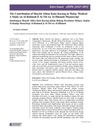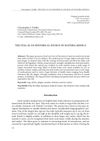 January 2024 in “International Journal of Research Publication and Reviews”
January 2024 in “International Journal of Research Publication and Reviews” The herbal hair serum with rosemary, hibiscus, and neem is safe and effective for hair care.
 January 2024 in “Journal of Ayurveda Campus”
January 2024 in “Journal of Ayurveda Campus” Psoralea corylifolia Linn. is a medicinal plant used for skin diseases and has various health benefits.
[object Object]  January 2024 in “Wiadomości Lekarskie”
January 2024 in “Wiadomości Lekarskie” Robotic hair transplantation with AI offers more reliable, precise, and efficient hair restoration.
 December 2023 in “Health Information Jurnal Penelitian”
December 2023 in “Health Information Jurnal Penelitian” Post-COVID syndrome causes long-lasting symptoms like fatigue, breathing issues, and anxiety.
 December 2023 in “Tuberkuloz ve Toraks/Tüberküloz ve toraks”
December 2023 in “Tuberkuloz ve Toraks/Tüberküloz ve toraks” Many COVID-19 patients have long-term symptoms, especially women, but certain medications may help reduce these symptoms.
 December 2023 in “Malahayati International Journal of Nursing and Health Science”
December 2023 in “Malahayati International Journal of Nursing and Health Science” Chemotherapy in children often causes hair loss, nausea, vomiting, and mood swings.
 December 2023 in “Revista de la Facultad de Ciencias Médicas (Quito)”
December 2023 in “Revista de la Facultad de Ciencias Médicas (Quito)” Fever and rash can be early signs of lupus.
 October 2023 in “Cognizance journal”
October 2023 in “Cognizance journal” The document suggests using natural remedies like bloodletting and honey for various health issues but lacks scientific evidence for their effectiveness.

Recognizing unusual brain and skin symptoms is crucial for diagnosing lupus early.
 September 2023 in “medRxiv (Cold Spring Harbor Laboratory)”
September 2023 in “medRxiv (Cold Spring Harbor Laboratory)” Long-COVID has diverse, long-term health impacts, especially in young people.
 September 2023 in “Journal of pharmacognosy and phytochemistry”
September 2023 in “Journal of pharmacognosy and phytochemistry” Plumbago zeylanica has valuable medicinal properties but needs sustainable cultivation methods.
 August 2023 in “Gadua Journal of Pure and Allied Science”
August 2023 in “Gadua Journal of Pure and Allied Science” Ziziphus spina-christi leaf extract lowered blood sugar and protected organs in diabetic rats.
 May 2023 in “Jurnal Sains Insani”
May 2023 in “Jurnal Sains Insani” Shaykh Abbas Kuta Karang significantly advanced Malay medical knowledge with his detailed manuscript.
 May 2023 in “Frontiers in veterinary science”
May 2023 in “Frontiers in veterinary science” A young tapir with a rare skin condition improved after treatment with wound cleaning, cream, and oral medication.
 April 2023 in “Research Square (Research Square)”
April 2023 in “Research Square (Research Square)” Many healthcare workers who had Covid-19 suffer from long-term symptoms like hair loss and fatigue, especially women.
 February 2023 in “Journal of clinical medicine research”
February 2023 in “Journal of clinical medicine research” Zinc acetate hydrate may help reduce fatigue and hair loss in post-COVID-19 patients.
 January 2023 in “Journal of pharmacognosy and phytochemistry”
January 2023 in “Journal of pharmacognosy and phytochemistry” Herbal home remedies can effectively treat hair loss with fewer side effects.

There is no cure for myotonic dystrophy type 1, so treatment focuses on managing symptoms and complications.
 January 2023 in “Acta historiae medicinae stomatologiae pharmaciae medicinae veterinariae”
January 2023 in “Acta historiae medicinae stomatologiae pharmaciae medicinae veterinariae” Stag parts were historically used in medicine for various health issues.

Social media data can help track and predict COVID-19 symptoms and trends.

Icosapent ethyl may help treat long-lasting symptoms after COVID-19.
 May 2022 in “Annals of the Rheumatic Diseases”
May 2022 in “Annals of the Rheumatic Diseases” It's unclear if COVID-19 vaccination causes SLE; more research is needed.
 May 2022 in “Journal of pharmacognosy and phytochemistry”
May 2022 in “Journal of pharmacognosy and phytochemistry” The evaluation of Creeping Daisy leaves found important characteristics and compounds that support its use in medicine.
 May 2022 in “Acta Scientific Women's Health”
May 2022 in “Acta Scientific Women's Health” A woman lost over 80% of her hair due to a condition called telogen effluvium after having COVID-19.

No single biomarker is reliable enough for diagnosing and assessing SLE.
 February 2022 in “International journal of KIU”
February 2022 in “International journal of KIU” Certain genes and nutrients like vitamin D, zinc, and omega fatty acids affect COVID-19 severity and infection risk.
[object Object] 
False daisy is a medicinal herb with many health benefits, including hair growth promotion.
 January 2022 in “International Journal of Biology Pharmacy and Allied Sciences”
January 2022 in “International Journal of Biology Pharmacy and Allied Sciences” Autoimmune diseases cause the immune system to attack the body, and management varies as some are curable and others are not.
 December 2021 in “International Journal of Biology Pharmacy and Allied Sciences”
December 2021 in “International Journal of Biology Pharmacy and Allied Sciences” Autoimmune diseases cause the immune system to attack the body, and management varies as some are curable and others are not.
 November 2021 in “Journal of pharmaceutical research international”
November 2021 in “Journal of pharmaceutical research international” Herbal depilatories are safer and cause fewer side effects than chemical ones for hair removal.






























